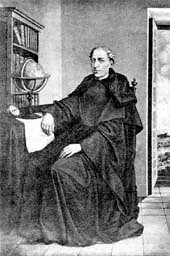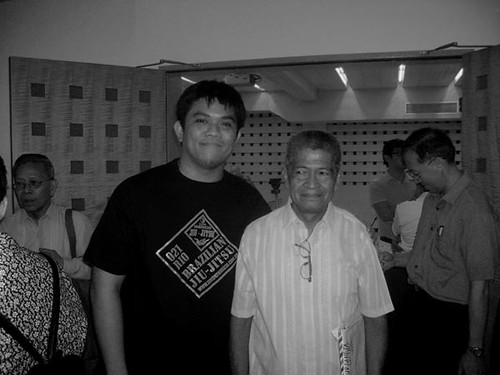The lecture room was packed with scholars and researchers, being late I stayed outside. Thanks to some good sounding speakers I was able to listen in, even if I was outside, looking in.

Although I failed to complete the whole program (which started in the morning), catching only last 2 hours or so of the event, I learned a great deal about Urdaneta. I know little of his accomplishments to be honest, since Rizal and the 17th century Philippines is where I concentrated much of my studies. I've read about his breakthrough discovery, his route that enabled Spain to establish settlements and commerce here in those critical days when the other European powers are in a race to find the new world. There was more about the man than I've thought; his life actually, is so colroful that it could be made a Hollywood movie.
Often people I know (including my father) would talk about the bad things that Spain did to us, portrayed as villains and corrupt. I always get ridiculed and made fun of whenever I try to explain the significance of their contributions. Fray Urdaneta contributions is certainly the greatest, for not only that he gave us our name but the route that he created placed our country in the world map, he was, in our modern terms, the pioneer of Filipino globalization.
A navigator and a soldier, the young Urdaneta became part of the Elcano & Loaysa expedition, commissioned to claim the Moluccas for Spain. It failed to achieve its goals, on 1521 almost all but one ship managed to stay up float, Elcano & Loaysa died in the seas, while the only ship that survived the unfortunate ordeal, the one ship that remained, landed in Mindanao. The group was headed by Carquizado, the men was stuck for nine long years in the islands before they managed to head back to Mexico. By this time, the Spice Islands were already under the Portuguese flag.
Urdaneta tried to arrange another campaign to set sail but failed. In 1553 he became a priest under the Augustinian order. His vocation was to focus on catholicizing the native people. When King Phillip ordered de Velasco to attempt to sail back to the islands, they sought the help of the veteran navigator Urdaneta, by now a priest. He declined because of his status, but was later on convinced to take part in the expedition, his majesty granting his conditions.
He wanted not to be in command, that's his condition! Choosing a relative to do so, Legazpi. He hand picked majority of the officers and priest that would embody the mission, most were Basque. The rest is history, when he made contact with the native in the islands; his ability to understand and speak the local dialect came in handy, he convinced the natives to accept their party. The mission to establish a foothold that would be the launching point for the islands evangelization was established. In the years that followed permanent Spanish settlements were realized (including Maynila).

What is not known by many, is that Urdaneta ordered all missionaries to evangelize the natives using their own language. This is one the reason why we kept our regional dialect even with the intense impression of the Spanish colonization. Urdaneta's depth of understanding of the native life led him to make this decision. He presumably understood the importance of communication with the locals using their own language, the impact would be lasting. This could also be the reason why Spanish as a language was not extensively desseminated in the islands during the critical founding years of government, as it was in other Latin countries.
My reflections on the sacrifices and brilliance of Urdaneta was quite an experience. I was right about what I believe and read, history will looks back at this men fairly, they can not be denied of their role in the creation of this country. Although it is a fact that abuses were indeed committed in the years that followed ( they were here for more than 300 years! our President's can't even keep their hands clean with their 6 year term), one could not deny the significance of Spanish governance and the religious work to our land, culture and faith. These were extraordinary men that sought to develop the islands and its people. Much of this contribution has been taken for granted, sometimes I can't help but wonder if our history book intentionally decreased the value of such noble contributions, did it robbed us of the real story or were just a forgetful race.
---
Some local government has initiated some efforts to recognize Urdaneta's legacy. Urdaneta city would be building a monument of friar, commissioned is national artist Abueva and other artist that would be involved in putting up a piece that would represent the achievements of Urdaneta. The commemoration text would be in English, Spanish, Basque, Ilocano and Panggalatok. This would all be in line with the 500th year celebration of the friars birthday.

Arellano resident scholar Prof. Andrade ended with this reminder, " we should be careful of the past, so we can view the future with hope."



cool! very informative!
ReplyDelete